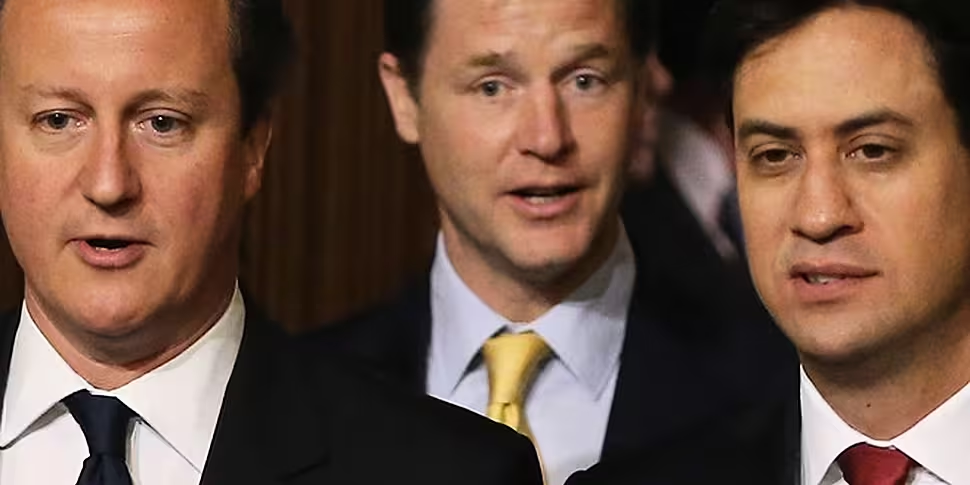The polling stations are closed. So what happens now?
We should have a "winner" by Friday. However, if you mean winner as in party with enough votes to form a government then that could take a bit longer to establish.
There are 650 seats in the House of Commons so for a party to be able to run the country effectively it needs 326 seats (one more than half).
However, because of a few quirks of the system - the Speaker's seat doesn't count and Sinn Fein don't take their seats - 323 is actually the magic number.
The polls have consistently indicated neither of the two main parties is likely to win a majority outright.
The two main parties will look around to see who they can form a coalition - or deal - with to get them over the 323 line. So in 2010 Conservatives (307) + Lib Dems (57) = coalition (364).
It's really all about the maths now.
The incumbent Prime Minister gets the first crack at forming a government (Cameron in this case). But he must be able to "command the confidence of the House of Commons". If he cannot then he must stand aside.
In any case the Conservatives and Labour could end up with an equal number of seats.
Cameron could win fewer seats but still remain in power. It happened before. In 1924 the party with the fewer seats formed a government.
Labour could win fewer seats but with the SNP could hit 323 and form a Government.
The public could end up with something they really didn't want just because the numbers don't add up.
David Cameron and his Coalition ministers will still run the country while all of this is going on- even if they lose their seats.
They will continue to be responsible for their departments but will not make any big decisions. If they have to then they will do so in consultation with the opposition party.
The really important thing to remember is that Mr Cameron is Prime Minister until he goes to the Queen and resigns.
How long will all these coalition negotiations take?
In 2010 it took the Lib Dems and Conservatives five days to reach an agreement but this time it could take as long as three weeks. It really depends on how the sums stack up.
What is the difference between a coalition and a deal?
We have had a coalition government for the last five years.
There has been a joint programme of policies cherry picked from each party's manifestos. There are both Lib Dem and Conservative ministers responsible for overseeing the implementation of these policies.
Deal/pact/agreement all come under the informal banner. These could operate in a number of ways, support for a programme of governing but disagreement on specific policies - a vote-for-vote basis.
Minority governments are generally seen as weak and prone to collapse while a formal coalition is more stable.
What is confidence and supply then?
It's a kind of deal, agreement or pact.
The confidence bit means the smaller party will agree to support the larger party in a vote of no confidence and the Queen’s Speech, which sets out the Government’s programme.
The supply bit means they will vote through the Budget, ie supply the cash.
Do they need a deal or agreement at all?
The important bit is the Queen's Speech, currently scheduled for 27 May.
Whichever party forms a Government – minority or otherwise – has to get its programme for the next five years, as detailed in the speech, through a House of Commons vote.
As long as they can muster enough support for this then they can try to govern. It doesn't have to be done through formal deals and pacts.
If they don't win the vote then it counts as a vote of no confidence. Game over.
If they can't sort it out can't we just have another election?
It's not that easy. After the coalition came to power they passed the Fixed-term Parliament Act. It means Parliament cannot be dissolved unless there is: a) a vote of no confidence in the Government or b) two-thirds of MPs vote to do so.
It makes a second election this year unlikely. It would also be very expensive and would likely trigger markets turmoil.
Could the party with the most votes not just try to go it alone?
It could try even but the key is surviving the Queen's Speech (see above).
Even if it succeeded it would be a very weak government and unlikely to last very long.
What happens if no one can form a Government and there can be no second election?
Slightly uncharted territory here. In 2010 in Belgium the Prime Minister resigned and it was two years before a majority could be formed. A caretaker government took charge and ruled for that period.
If the markets went into tailspin and the future of the country was at stake then there could be a grand coalition, ie MiliCam or Camband. Other countries have them (see Germany).
But let’s be clear both of these options fall under "really not very likely".









